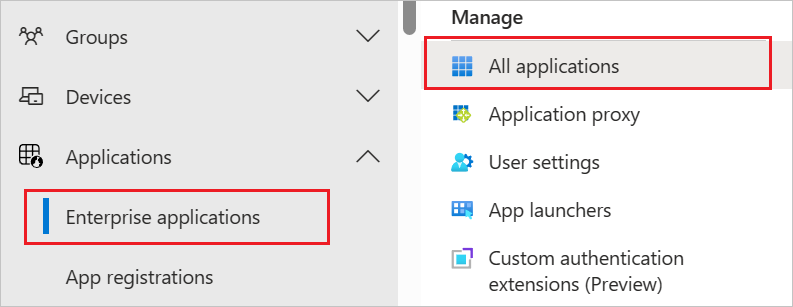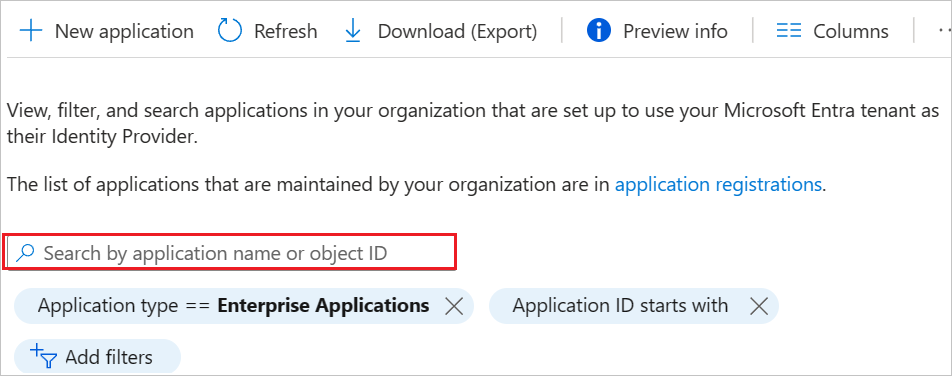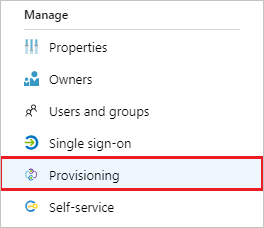Tutorial: Configure Apple Business Manager for automatic user provisioning
This tutorial describes the steps you need to perform in both Apple Business Manager and Microsoft Entra ID to configure automatic user provisioning. When configured, Microsoft Entra ID automatically provisions and de-provisions users to Apple Business Manager using the Microsoft Entra provisioning service. For important details on what this service does, how it works, and frequently asked questions, see Automate user provisioning and deprovisioning to SaaS applications with Microsoft Entra ID.
Capabilities Supported
- Create users in Apple Business Manager
- Remove users in Apple Business Manager when they do not require access anymore
- Keep user attributes synchronized between Microsoft Entra ID and Apple Business Manager
- Single sign-on to Apple Business Manager (recommended).
Prerequisites
The scenario outlined in this tutorial assumes that you already have the following prerequisites:
A user account in Microsoft Entra ID with permission to configure provisioning (for example, Application Administrator, Cloud Application administrator, Application Owner, or Global Administrator).
An Apple Business Manager account with the role of Administrator or People Manager.
Configure and verify the domain you want to use. See Link to new domains.
Configure (but do not turn on) federated authentication. See Turn on and test federated authentication.
Note
If federated authentication is already turned on, you can still proceed. See the recommendations in the previous section.
Determine the type of syncing in Mcirosft Entra ID, and if necessary, create groups for syncing only assigned accounts to the Apple Business Manager Azure AD app:
- Sync only assigned users.
- Sync all users.
Have on call a Microsoft Entra ID administrator with permissions to edit enterprise applications. When both of you are ready, see Use SCIM to import users.
Note
Token transfer to Microsoft Entra ID and establishing a successful connection has to be completed in 4 calendar days or the process has to be started again.
Step 1: Plan your provisioning deployment
- Learn about how the provisioning service works.
- Determine who will be in scope for provisioning.
- Determine what data to map between Microsoft Entra ID and Apple Business Manager.
Step 2: Configure Apple Business Manager to support provisioning with Microsoft Entra ID
In Apple Business Manager, sign in as a user that has the role of Administrator or People Manager.
Select your name at the bottom of the sidebar, select Preferences, then select Directory Sync.
Select Connect next to SCIM, carefully read the warning, select Copy, then select Close.
The Connect to SCIM window, which provides a token and a Copy button under it. In the bottom right-hand corner is the window’s Close button.
Leave this window open to copy the tenant URL from Apple Business Manager to Azure AD.

Note
The secret token shouldn’t be shared with anyone other than the Microsoft Entra administrator.
Step 3: Add Apple Business Manager from the Microsoft Entra application gallery
Add Apple Business Manager from the Microsoft Entra application gallery to start managing provisioning to Apple Business Manager. If you have previously setup Apple Business Manager for SSO, you can use the same application. However it is recommended that you create a separate app when testing out the integration initially.
To add the Apple Business Manager Microsoft Entra app with Microsoft tenants, the administrator of the tenants must go through the federated authentication setup process, including testing authentication. When authentication has succeeded, the Apple Business Manager Microsoft Entra app is populated in the tenant and the administrator can federate domains and configure Apple Business Manager to use SCIM (System for Cross-domain Identity Management) for directory sync.
Use federated authentication with MS Microsoft Entra ID in Apple Business Manager
Step 4: Define who will be in scope for provisioning
The Microsoft Entra provisioning service allows you to scope who will be provisioned based on assignment to the application and or based on attributes of the user / group. If you choose to scope who will be provisioned to your app based on assignment, you can use the following steps to assign users and groups to the application. If you choose to scope who will be provisioned based solely on attributes of the user or group, you can use a scoping filter as described here.
Start small. Test with a small set of users and groups before rolling out to everyone. When scope for provisioning is set to assigned users and groups, you can control this by assigning one or two users or groups to the app. When scope is set to all users and groups, you can specify an attribute based scoping filter.
If you need additional roles, you can update the application manifest to add new roles.
Step 5: Configure automatic user provisioning to Apple Business Manager
Sign in to the Microsoft Entra admin center as at least a Cloud Application Administrator.
Browse to Identity > Applications > Enterprise applications

In the applications list, select Apple Business Manager.

Select the Provisioning tab.

Set the Provisioning Mode to Automatic.

Under the Admin Credentials section, input the SCIM 2.0 base URL and Access Token values retrieved from Apple Business Manager in Tenant URL and Secret Token respectively. Click Test Connection to ensure Microsoft Entra ID can connect to Apple Business Manager. If the connection fails, ensure your Apple Business Manager account has Admin permissions and try again.

Note
If the connection is successful, Apple Business Manager shows the SCIM connection as active. This process can take up to 60 seconds for Apple Business Manager to reflect the latest connection status.
In the Notification Email field, enter the email address of a person or group who should receive the provisioning error notifications and check the checkbox - Send an email notification when a failure occurs.

Click Save.
Under the Mappings section, select Synchronize Microsoft Entra users to Apple Business Manager.
Review the user attributes that are synchronized from Microsoft Entra ID to Apple Business Manager in the Attribute Mapping section. The attributes selected as Matching properties are used to match the user accounts in Apple Business Manager for update operations. Select the Save button to commit any changes.
Attribute Type active Boolean userName String name.givenName String name.familyName String name.givenName String externalId String locale String timezone String urn:ietf:params:scim:schemas:extension:enterprise:2.0:User:employeeNumber String urn:ietf:params:scim:schemas:extension:enterprise:2.0:User:costCenter String urn:ietf:params:scim:schemas:extension:enterprise:2.0:User:division String urn:ietf:params:scim:schemas:extension:enterprise:2.0:User:department String To configure scoping filters, refer to the following instructions provided in the Scoping filter tutorial.
To enable the Microsoft Entra provisioning service for Apple Business Manager, change the Provisioning Status to On in the Settings section.

Define the users and/or groups that you would like to provision to Apple Business Manager by choosing the desired values in Scope in the Settings section.

When you are ready to provision, click Save.

This operation starts the initial synchronization of all users and/or groups defined in Scope in the Settings section. The initial sync takes longer to perform than subsequent syncs, which occur approximately every 40 minutes as long as the Microsoft Entra provisioning service is running.
Step 6: Monitor your deployment
Once you've configured provisioning, use the following resources to monitor your deployment:
- Use the provisioning logs to determine which users have been provisioned successfully or unsuccessfully
- Check the progress bar to see the status of the provisioning cycle and how close it is to completion
- If the provisioning configuration seems to be in an unhealthy state, the application will go into quarantine. Learn more about quarantine states here.
Additional resources
- Managing user account provisioning for Enterprise Apps
- What is application access and single sign-on with Microsoft Entra ID?
- Review SCIM requirements for Apple Business Manager
- How a Person ID is used in Apple Business Manager
- Use SCIM to import users into Apple Business Manager
- Resolve SCIM user account conflicts in Apple Business Manager
- Delete Microsoft Entra accounts that appear in Apple Business Manager
- View SCIM activity in Apple Business Manager
- Manage existing SCIM token and connections in Apple Business Manager
- Disconnect the SCIM connection in Apple Business Manager
- Troubleshooting the SCIM connection in Apple Business Manager
Next steps
Feedback
Coming soon: Throughout 2024 we will be phasing out GitHub Issues as the feedback mechanism for content and replacing it with a new feedback system. For more information see: https://aka.ms/ContentUserFeedback.
Submit and view feedback for